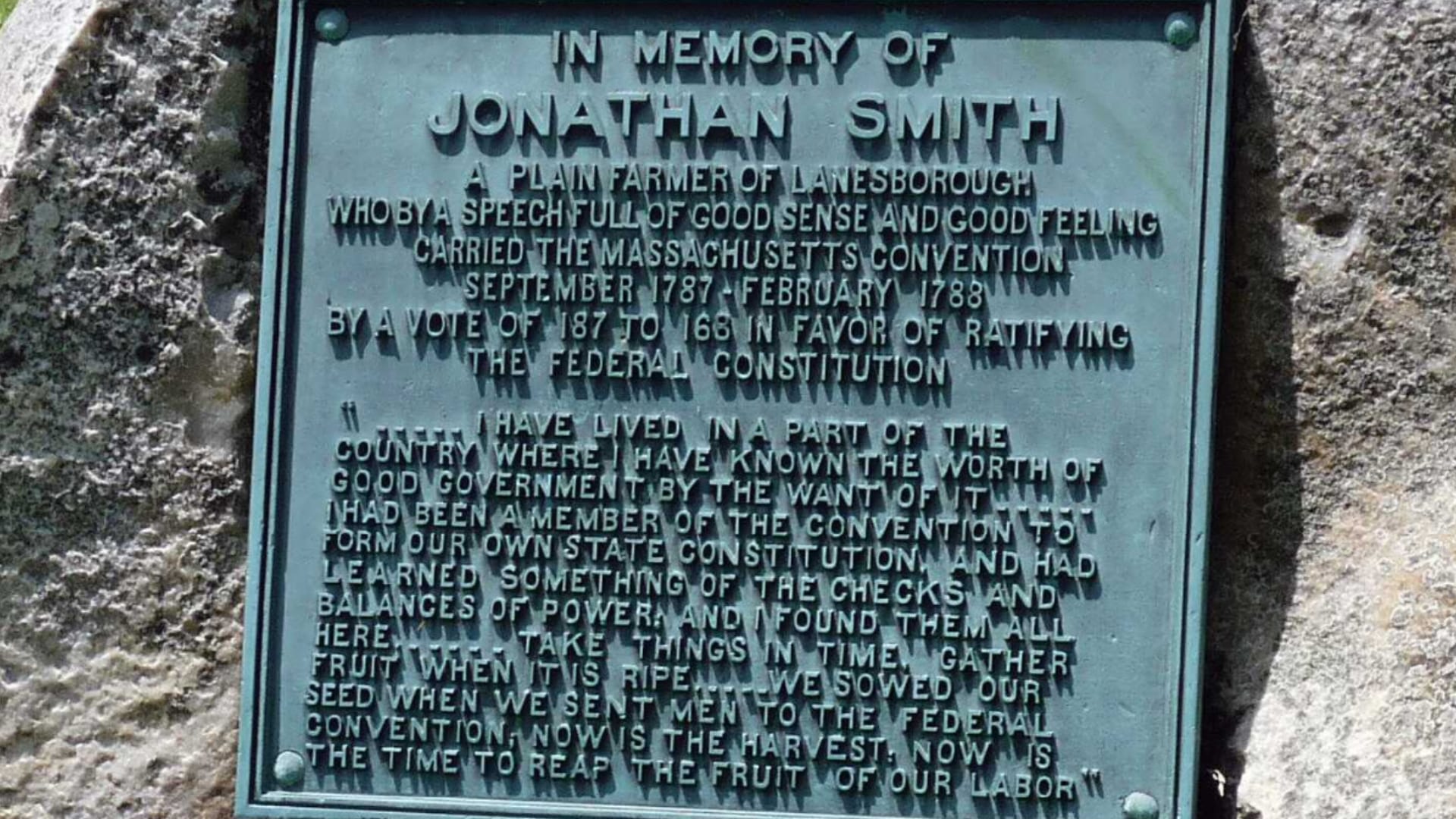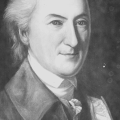When the second and third teams are impressive, you know the first team must be really good.
Americans studying the Constitution tend to focus on the first team—James Madison, Alexander Hamilton, James Wilson, and so forth. But doing so doesn’t give you a full view of how brilliant the Founders were.
One way to appreciate that is to consider the quality of those participants (men and women) whom the states did not send to the federal convention of 1787. One way to do that is to read the records of the state conventions that ratified the Constitution.
You’ll find many first teamers at those state conventions—including Madison, Hamilton, and Wilson. But you’ll also meet notable second-teamers like John Marshall of Virginia (later Chief Justice of the United States) and Thomas McKean of Pennsylvania (then Chief Justice of his state).
And a fellow from Massachusetts named Jonathan Smith.
Convention delegates from the rural, western parts of Massachusetts—particularly farmers—were suspicious of the new Constitution. After all, lawyers and other prosperous citizens had drafted it and were supporting it. At the Massachusetts convention, leading opponents, such as Amos Singletary of Sutton, played on those suspicions.
Smith was a farmer from the western part of the state—from Lanesborough in Berkshire County, near the New York border. But he supported the Constitution. He undertook the job of trying to win over some of his fellow western Massachusetts farmers.
Smith delivered his primary convention speech on Jan. 25, 1788. It focused on Shays’ Rebellion of 1786. He argued that Americans needed a central government strong enough to protect them against further turmoil.
Smith’s argument for more government might sound quaint today, when the federal establishment has grown far beyond the Constitution’s limits and become abusive and sometimes corrupt. But remember that Smith spoke when we did not have enough government—when threatened anarchy threatened tyranny.
We know Smith’s speech was highly effective, because several other delegates are recorded as saying so.
Jonathan Smith’s Background
Jonathan Smith (not to be confused with John Smith, the Jamestown settler) was born around 1740, so he was about 47 years old at the time of the convention. He served as a militia colonel during the Revolution, and some records refer to him as “Col. Smith.” He apparently saw combat in the Battle of Long Island (1776). A great deal about his life is not known, but he apparently was married, with at least two sons. He died in 1802, at the age of 62.
Smith’s speech portrayed himself as a simple farmer—a “ploughjogger.” He was, indeed, a farmer. But he was much more.
Smith had served six one-year terms in the state house of representatives and one term in the state senate. From 1779 to 1780, he was a delegate to the convention that drafted the Massachusetts state constitution.
In his speech, he said, “I never had any post, nor do I want one.” He could say this because legislative seats were not considered offices or “posts.”
Smith’s talk was designed to sound rustic. But a careful reading shows that he had read his Cicero. The speech is constructed along the lines of a classic Roman oration.
In keeping with Roman practice, it begins with an exordium designed to create a favorable first impression with the audience. It then proceeds to a narration, which outlines key facts. Next comes the confirmation, in which Smith makes his central point. After that is the refutation, in which he responds to his opponents. The speech ends with a peroration, designed to cement his case.
I’ve reproduced Smith’s oration below, as recorded by the convention’s shorthand reporter. I have marked the beginning of the exordium, narration, confirmation, refutation, and peroration.
Notice all the devices Smith uses to persuade: a down-home manner, humor, mild sarcasm, pity, fear, homey examples any farmer would appreciate, and—in the peroration—a borrowing from the Bible.
Notice also how he responds to the class envy the Constitution’s opponents were trying to stir up.
Opponents attempted to throw Smith off stride by interrupting (marked below in ellipsis, as “. . . .”). It didn’t work.
I urge you to read the speech aloud. When I was teaching Constitutional History in law school, I would ask a student to read it aloud to the rest of the class. At the end, there was not a dry eye in the house.
And remember: Jonathan Smith wasn’t even on the first team!
Here goes:
(Exordium)
“Mr. President [John Hancock, the governor and convention president], I am a plain man, and get my living by the plough. I am not used to speak in public, but I beg your leave to say a few words to my brother ploughjoggers in this house.
(Narration)
“I have lived in a part of the country where I have known the worth of good government by the want of it. There was a black cloud that rose in the east last winter, and spread over the west. . . . I mean, sir, the county of Bristol; the cloud rose there, and burst upon us, and produced a dreadful effect. It brought on a state of anarchy, and that led to tyranny.
“I say, it brought anarchy. People that used to live peaceably, and were before good neighbors, got distracted, and took up arms against government. . . .
“I am going, Mr. President, to show you, my brother farmers, what were the effects of anarchy, that you may see the reasons why I wish for good government. People, I say, took up arms; and then, if you went to speak to them, you had the musket of death presented to your breast. They would rob you of your property; threaten to burn your houses; oblige you to be on your guard night and day; alarms spread from town to town; families were broken up; the tender mother would cry, ‘O, my son is among them! What shall I do for my child?’
“Some were taken captive, children taken out of their schools, and carried away. Then we should hear of an action, and the poor prisoners were set in the front, to be killed by their own friends. How dreadful, how distressing was this!
“Our distress was so great that we should have been glad to snatch at any thing that looked like a government. Had any person, that was able to protect us, come and set up his standard, we should all have flocked to it, even if it had been a monarch; and that monarch might have proved a tyrant;—so that you see that anarchy leads to tyranny, and better have one tyrant than so many at once.
(Confirmation)
“Now, Mr. President, when I saw this Constitution, I found that it was a cure for these disorders. It was just such a thing as we wanted. I got a copy of it, and read it over and over. I had been a member of the Convention to form our own state constitution, and had learnt something of the checks and balances of power, and I found them all here. I did not go to any lawyer, to ask his opinion; we have no lawyer in our town, and we do well enough without. I formed my own opinion, and was pleased with this Constitution.
(Refutation)
“My honorable old daddy there [pointing to Mr. Singletary] won’t think that I expect to be a Congress-man, and swallow up the liberties of the people. I never had any post, nor do I want one. But I don’t think the worse of the Constitution because lawyers, and men of learning, and moneyed men, are fond of it. I don’t suspect that they want to get into Congress and abuse their power. I am not of such a jealous make. They that are honest men themselves are not apt to suspect other people. I don’t know why our constituents have not a good right to be as jealous of us as we seem to be of the Congress; and I think those gentlemen, who are so very suspicious that as soon as a man gets into power he turns rogue, had better look at home.
“We are [i.e., Massachusetts], by this Constitution, allowed to send ten members to Congress. Have we not more than that number fit to go? I dare say, if we pick out ten, we shall have another ten left, and I hope ten times ten; and will not these be a check upon those that go? Will they go to Congress, and abuse their power, and do mischief, when they know they must return and look the other ten in the face, and be called to account for their conduct? Some gentlemen think that our liberty and property are not safe in the hands of moneyed men, and men of learning. I am not of that mind.
“Brother farmers, let us suppose a case, now: Suppose you had a farm of 50 acres, and your title was disputed, and there was a farm of 5000 acres joined to you, that belonged to a man of learning, and his title was involved in the same difficulty; would you not be glad to have him for your friend, rather than to stand alone in the dispute? Well, the case is the same. These lawyers, these moneyed men, these men of learning, are all embarked in the same cause with us, and we must all swim or sink together; and shall we throw the Constitution overboard because it does not please us alike?
“Suppose two or three of you had been at the pains to break up a piece of rough land, and sow it with wheat; would you let it lie waste because you could not agree what sort of a fence to make? Would it not be better to put up a fence that did not please every one’s fancy, rather than not fence it at all, or keep disputing about it until the wild beasts came in and devoured it?
(Peroration)
“Some gentlemen say, Don’t be in a hurry; take time to consider, and don’t take a leap in the dark. I say, Take things in time; gather fruit when it is ripe.
“There is a time to sow and a time to reap; we sowed our seed when we sent men to the federal Convention; now is the harvest, now is the time to reap the fruit of our labor.
“And if we won’t do it now, I am afraid we never shall have another opportunity.”




